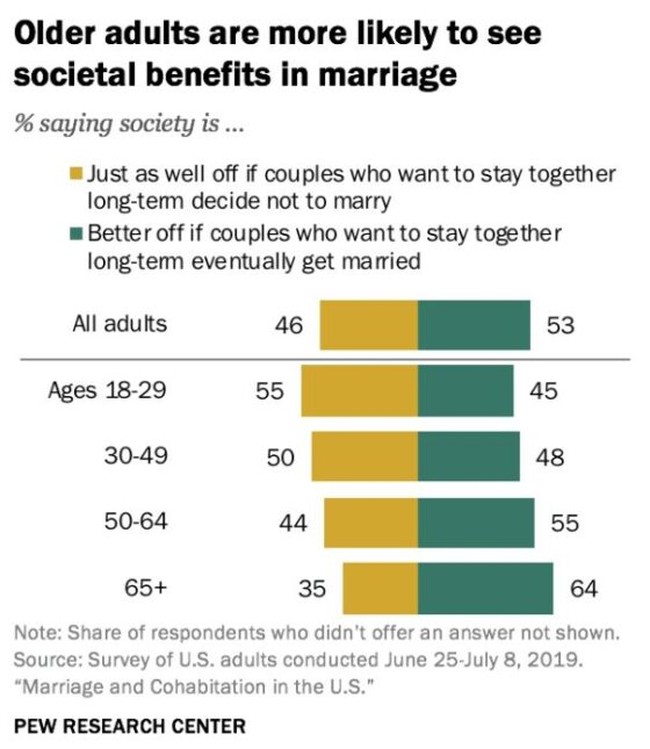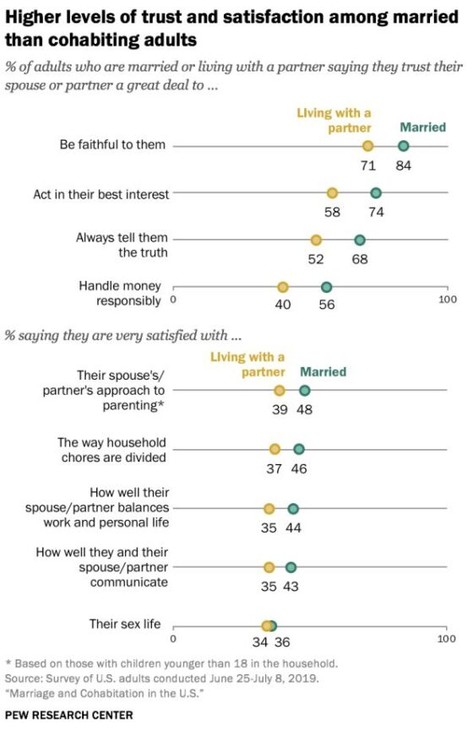I’ve seen a couple of articles now responding to economist Melissa Kearney’s book titled “The Two-Parent Privilege.” The gist of the book is that kids are undeniably better off with two parents for reasons that are financial (two incomes are better than one) and personal (two parents have more time to devote to bringing up children than one). Some have taken it as a call to highlight the benefits of marriage over single-motherhood and that is instantly controversial because some feminists are deeply suspicious of that idea.
Case in point, Jill Filipovic has an opinion piece for CNN arguing in a very roundabout fashion that conservatives are to blame for the decline of marriage.
Kearney bills herself as a moderate, but her argument is being taken up by a great many conservatives who argue that her findings, which are robustly supported by the data, demonstrate that liberal mores around family formation have destroyed the nuclear family and left children worse off. The answer, they say, is for liberals to own up to their wrongdoing and for all of us to start promoting marriage.
A closer look at the facts on the ground, though, shows that the problem isn’t a cultural rejection of marriage, or a nationwide feminist rejection of the nuclear family (I wish). Most people want to get married. The problem is that decades of largely conservative policy-making have fueled inequality, gutted the working class, left a generation of men isolated and under-employed and unmoored, impoverished families and made it harder for women to both control their own fertility and find suitable partners.
Let’s look at this more closely. First notice that Filipovic is not really arguing that Kearney is fundamentally wrong about the benefits of marriage to children. Instead she’s arguing over who is to blame for the decline of marriage. As she sees it, that blame falls on conservatives who opposed unionization and left a bunch of blue collar men unappealing as marital partners.
But also notice that she’s offering this alternative in lieu of the idea that this is a cultural problem created by liberal reshaping of norms. In other words, she’s blaming the right to excuse the left.
But even in these few paragraphs I’m not sure her argument holds up. For instance, I clicked the link she provided to prove people still want to get married and well…it doesn’t really say that. Here’s a Pew article from 2019 on marriage and cohabitation.
The share of U.S. adults who are currently married has declined modestly in recent decades, from 58% in 1995 to 53% today. Over the same period, the share of adults who are living with an unmarried partner has risen from 3% to 7%. While the share who are currently cohabiting remains far smaller than the share who are married, the share of adults ages 18 to 44 who have ever lived with an unmarried partner (59%) has surpassed the share who has ever been married (50%), according to a Pew Research Center analysis of the National Survey of Family Growth (NSFG).
Young adults are particularly accepting of cohabitation – 78% of those ages 18 to 29 say it’s acceptable for an unmarried couple to live together, even if they don’t plan to get married – but majorities across age groups share this view. Still, even among those younger than 30, a substantial share (45%) say society is better off if couples who want to stay together long-term eventually get married. Roughly half of those ages 30 to 49 say the same, as do majorities of those ages 50 and older.
Here’s the chart that sums this up. Overall, respondents were more likely to say society is better off if people get married. But that’s only a majority view for those 50 and older. For those 18-48, the majority view is that marriage makes no difference.

So, Filipovic can argue that young people are just reacting to the lack of men worth marrying but there’s clearly a cultural element here as well. Young people simply feel differently about the value of marriage than older people. To put it another way, even if we somehow fixed the problems Filipovic points to, you’d still have a majority of those 18-29 who don’t think getting married matters. That’s a cultural shift.
The Pew article goes on to point out that, whether they know it or not, the people who believe cohabitation is just as good as marriage are wrong. In fact there’s a pretty significant difference in almost every category Pew asked about.

So, getting back to what Filipovic wrote, it might be more accurate to say fewer younger people see marriage as important today and don’t seem to see any benefit to it over just living together.
That said, she does have a point that the percentage of people living without a partner is rising faster than those cohabiting without getting married. And it’s also true that men are less likely to have partners than women. So there may be some truth to the idea that men aren’t as appealing as they once were, in part because they aren’t as financially successful. But I’m not sure you can attribute all or even most of the decline in marriage to that idea.
Some of this really is cultural and I’ve seen that play out with people I’ve known in real life. I’ve known men with high earning jobs and bright futures who delayed getting married or never got married. This wasn’t because they weren’t a good catch financially or otherwise. It was because they had grown up with different expectations about marriage and whether it was something even worth considering. I don’t think supporting more unionization is going to fix that.








Join the conversation as a VIP Member